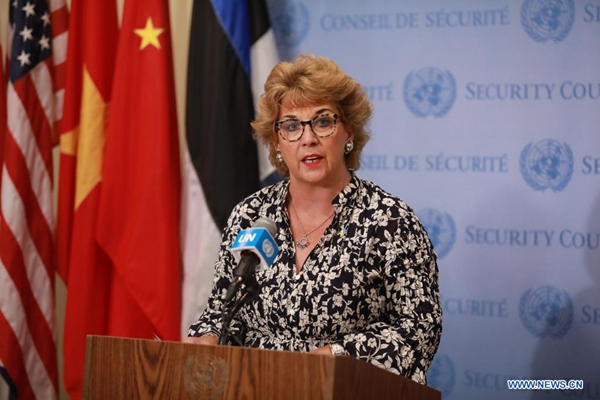UN Security Council adopts resolution to extend cross-border aid mechanism for Syrians
 0 Comment(s)
0 Comment(s) Print
Print E-mail Xinhua, July 10, 2021
E-mail Xinhua, July 10, 2021

The UN Security Council on Friday adopted a resolution to extend the authorization of the cross-border aid mechanism for Syrians for 12 months.
Resolution 2585, which won the unanimous support of the 15-member council, will allow cross-border aid into Syria from Turkey to run for another 12 months. The current 12-month authorization of aid through the Bab al-Hawa border crossing expires on Saturday.
The draft resolution was adopted unanimously after Russia and the United States reached compromise in last-minute talks.
By Thursday, the Security Council was set to vote on two competing draft resolutions: one tabled by Ireland and Norway, the co-penholders of the issue, and the other tabled by Russia.
The Ireland-Norway text seeks a 12-month extension of the mandate for Bab al-Hawa, while the Russian text would allow an extension of the border crossing for only six months.
Russia and the United States were able to bridge the differences in the two drafts and jointly tabled the final text together with Ireland and Norway.
Resolution 2585 decides to extend the mandate for Bab al-Hawa border crossing for six months, till Jan. 10, 2022, with an extension of an additional six months, till July 10, 2022, subject to the issuance of the UN secretary-general's substantive report, with particular focus on transparency in operations, and progress on cross-line access in meeting humanitarian needs.
It requests the secretary-general to brief the Security Council monthly and to provide a report on a regular basis, at least every 60 days, on the implementation of relevant Security Council resolutions and on compliance by all relevant parties in Syria.
It further requests the secretary-general to include in his reports overall trends in UN cross-line operations and detailed information on the humanitarian assistance delivered through UN humanitarian cross-border operations, including the distribution mechanism, the number of beneficiaries, operating partners, locations of aid deliveries at district-level and the volume and nature of items delivered.
UN Secretary-General Antonio Guterres welcomed the adoption of Resolution 2585.
"Cross-border humanitarian assistance remains a lifeline for millions of people in the (Northwest) area and beyond. The re-authorization will ensure humanitarian assistance continues for over 3.4 million people in need, including 1 million children," said Stephane Dujarric, spokesman for Guterres, in a statement.
The United Nations continues to engage with all parties to also facilitate cross-line convoys. They are critical for the expansion of the overall response as humanitarian needs continue to grow. The secretary-general reiterates his call on all parties to the conflict to ensure humanitarian access to all people in need in accordance with international humanitarian law, said the statement.
Irish UN ambassador Geraldine Byrne Nason said Friday was "a good-news day."
"We are pleased to announce that the Security Council has come together to unanimously adopt a resolution that allows for an extension of the Bab al-Hawa crossing for 12 months. This is the first time since 2016 that a united Security Council acted on its humanitarian responsibility for Syria in this way," she told reporters after the adoption of Resolution 2585.
This 12-month renewal allows for predictability. This is critical to the brave humanitarian actors who work in extremely difficult and dangerous circumstances to assist those who are in grave need in Syria, said Nason.
Norwegian UN ambassador Mona Juul said the humanitarian situation in Syria has only worsened over the last year. And the COVID-19 pandemic only compounded the crisis.
"After 10 years, people are still suffering due to the conflict in Syria. Providing emergency relief is imperative to keeping people alive. But what people also need is peace, security and a political solution for a prosperous future. Ireland and Norway will continue their active engagement in the Security Council as penholders on this file. And the Syrian people will remain our number one priority," said Juul.
Zhang Jun, China's permanent representative to the United Nations, called for the enhancing of cross-line aid delivery in Syria and the lifting of unilateral sanctions against the country.
In an explanation of his country's vote after the vote at the Security Council, he said China welcomes the fact that the council unanimously adopted the draft resolution on the extension of humanitarian delivery in Syria.
In China's view, all humanitarian operations in Syria should be based on the full respect for the country's sovereignty and territorial integrity. The cross-border mechanism is a special arrangement conceived under specific circumstances. And as such, it should be subjected to timely assessment and necessary adjustment as to its efficacy and applicability in light of the situation on the ground, with a view to transitioning from cross-border to cross-line delivery, he said.
The cross-border mechanism is a controversial matter, both politically and legally, whereas the cross-line mechanism should be the dominant channel for delivering humanitarian assistance. Expression of support for cross-line assistance must not remain empty words. The Security Council should identify what stands in the way of cross-line delivery and urge parties concerned to open up as early as possible the delivery route from Damascus to Northwest Syria, he said.
It should be stressed that unilateral sanctions are the main obstacles to improving the humanitarian situation in Syria. The international community enjoys a broad consensus on this. China expects Security Council members to continue to take effective measures to eliminate the negative impact of unilateral sanctions and to create favorable conditions for fundamentally overcoming the challenges in the humanitarian situation in Syria and guaranteeing the well-being of the Syrian people, he said.
Since 2014, the Security Council had authorized the delivery of aid through four border crossings on Syria's borders with Turkey, Iraq and Jordan. In the past 12 months, only operations through Bab al-Hawa have been allowed.






Go to Forum >>0 Comment(s)